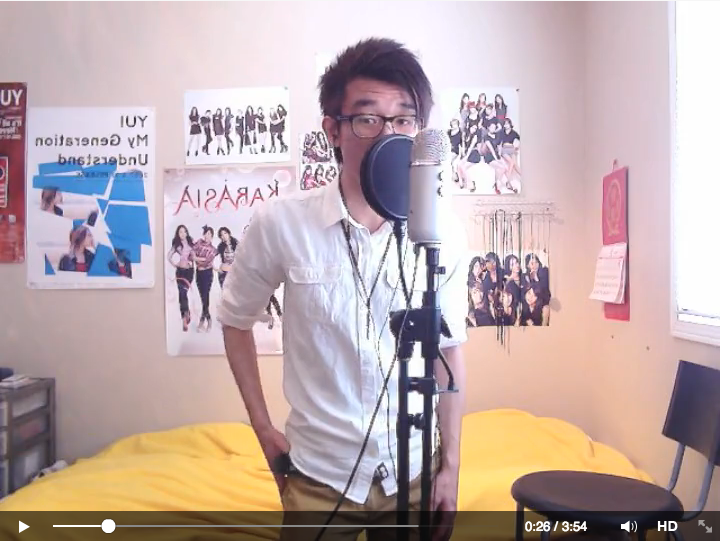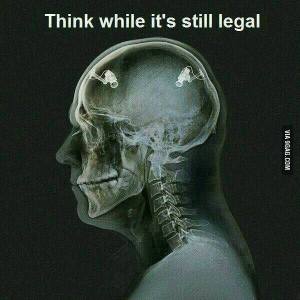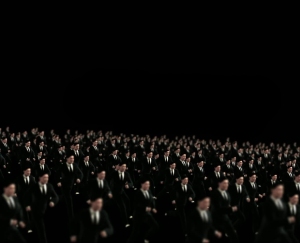Favourite Kafka on the Shore quote, currently:
“I’m appearing here in human form, but I’m neither god nor Buddha. My heart works differently from humans’ hearts because I don’t have any feelings … I’m a metaphysical, conceptual object. I can take on any form, but I lack substance… I’m an abstract concept.”
—
Comments from my professor concerning my writing:
“An interesting ‘vapoury’ style that seems to hover off world at times. …atmosphere and dialogue are strong…shows assurance and poise. Also very promising in suggestions. …Author’s intent to invoke/evoke mystery is very effective…haunting and strange (which is good); intelligence present on page…some sense of terror in the core here… You’re on to something different, striking.”
– B.W. Powe, Associate Professor, Dept of English, York University and author of A Tremendous Canada of Light, A Climate Charged, Outage, The Unsaid Passing, and Marshall McLuhan and Northrop Frye: Apocalypse and Alchemy
—
Updates:
 Espresso Love has been so taxing, and it needs so much research and so many sources of insight. I’ve been researching on things like trauma scene biohazard disposal teams, the mutual cooperation and security treaty between postwar Japan and United States in 1950s/1960s, and the economic growth then, extensive listening to classical music like Paganini, Mendelssohn, Brahms, onwards, convenient store franchises like Seven Eleven, gestalt psychology, George Berkeley, Hegel, Baudrillard and more… there’s so much work! Makes me really respect authors who put in their effort and time behind the scenes. Even when it was just a brief mention it was necessary to do the research. Sometimes the research feels wasted because it was only a sentence or two where it was necessary.
Espresso Love has been so taxing, and it needs so much research and so many sources of insight. I’ve been researching on things like trauma scene biohazard disposal teams, the mutual cooperation and security treaty between postwar Japan and United States in 1950s/1960s, and the economic growth then, extensive listening to classical music like Paganini, Mendelssohn, Brahms, onwards, convenient store franchises like Seven Eleven, gestalt psychology, George Berkeley, Hegel, Baudrillard and more… there’s so much work! Makes me really respect authors who put in their effort and time behind the scenes. Even when it was just a brief mention it was necessary to do the research. Sometimes the research feels wasted because it was only a sentence or two where it was necessary.
I realize that my ambition to complete the novel ASAP is really naive or impatient. But I worry about my developing writing skills, I want to capture my heart and mind of the current moment. If I continue to write it through the entire year, I know I will change and have a different perspective later. So there is this sense of urgency and pressure I’ve created for myself. I’m at 98,000 words and there is still another great chunk of the novel to go; the editing process is looking intimidating! haha
Last Thursday I was interviewed by a masters student at Ryerson/York researching about cell phone novels downtown and then headed to visit Wattpad.com headquarters. They moved into a massive space (two floors, rooms full of Macs and computer programmers, so many meeting rooms and high tech gadgets and a rooftop patio!). They are an enormous online writing / reading community with millions of people worldwide, based here in Toronto. Unfortunately, they weren’t designed with cell phone novels in mind or cater towards that so I didn’t end up starting on that site in the beginning. But I am in the talks with them as they’re interested in featuring my work on their site and to carefully see how the cell phone novel movement can start there.
In my university’s bookstore, on the textbook floor today, I’m realizing that it is probably the best way to browse for new books: research / reading material all chosen by professors laid out before me. I should spend more time browsing those shelves. Lots of good titles, fundamental building blocks of certain fields and classics. Saw a lot of Franz Kafka today.
I uploaded my cover of Start Over by Nano ft. MY FIRST STORY a while ago. Check it out by clicking the image below!

—
My professor signed his reply like this: “keep at it. let the words burn for you.” Epic.
—
Psycho Blabber:
The core of most literature , most art, philosophy and a lot of things in human history etc comes down to one question: Who Am I? Most things actually on the fundamental deals with identity. And most problems in the world begins with identity. The text of personal philosophies I am working on makes sense more when having this perspective. It is essential to develop the core of the self and the mind.
After a discussion with friends about usual deep subjects like the world, society, politics but eventually ending up on the topic of parenting and children, I feel that most children and well most people who have issues particularly in terms of social behaviour and relations, comes down to 1) insecurity of self identity and role and 2) the conflict between self and the world around, usually in the instinctive form of individual vs system, hence you have kids struggling against rules or family or hierarchy and structure consciously or subconsciously and many other issues arise. But this is something all human beings experience all the time universally and it never stops. This is like a very very fundamental root of lots of things.
The question is how to address it. In my set of personal philosophies and counselling experience, there are ways to address it and train up the self, starting from the roots of the human condition. But that’s a story for another time!
—
Psycho Blabber 2:
Deconstruction. This is one “technique” I use very often to start, whenever it comes to any sort of logical approach, whether for philosophy, debates, social commentary, dealing with human psychology etc. I think the most important core to thinking is the ability to cut through all the crap we are given and remove it all, and settle in with the bare bones. Now Deconstruction takes it even further, remove and destroy the bare bones too, start with nothing, start from scratch. If the focus of the topic doesn’t exist, we turn to ourselves and our core, how we feel, how we think, our values, our beliefs, who we think we are, and through the process of considering our own relation to the world around and the object or topic at hand. And next, by searching for a greater structure/pattern or abstract concept which is behind the scenes and governs the topic in consideration, we compare this topic with another related or seemingly unrelated topic and find correlations between them – are there existing structures or patterns that applies to both or more objects of study?
After considering all these relations: from us to our own emotions, identity, existing values and convictions; us and the world around; us and the topic of study; topic vs its underlying abstract concepts, structures, and patterns; topic compared other topics of relevance or irrelevance; and onwards, we take such relations and devise our own ways of thinking, and our own conclusions. We endeavour to come up with more than one conclusion and keep the mind open. Then we weigh each approach and analysis with one another and see which one makes the most sense to us personally.
Deconstruction, to me, isn’t about removing all potential influence, because no doubt we can’t remove history and influences that have seeped into our subconscious and unconscious, even if we don’t consciously consider it of relevance, but it is starting with the core of ourselves first.
Often people take things at face value too often. They focus too much on the external world and let the influences of things around affect and batter them. This “deconstructive” beginning and movement into criticism and analysis can be applied as a process to almost anything, including those things we are told, like for example if you were to read an article or a novel, some book of philosophy, whatever school of thoughts, or even what I’ve written here. Deconstruct it first, then apply these relations. Of course, this is probably most effective for people who have already identified or understood some foundations about their own inner core, their character, values, beliefs, passions, goals, awareness of their emotions, and so on.
However this technique, can be, for example, applied to the lack of knowledge of own identity itself. Meaning, destroy all conventional and traditional concepts of identity that already exists, remove it all. Thing is, “identity” and the so called need to know your “identity” are external influences, they are conventional ideas already fed to us by other sources. Like people who say they know who they are, or writing that tells you, you need to be this or that, or even personality tests and all that. There are countless external sources of influence that subconsciously infiltrate your mind. So here, deconstruction can mean, removing all notion of identity first, then reconstruct it in your own way. First, there is no need to know your identity: no one truly knows. Second, who cares about identity anyway? Who cares about knowing who you are? Third, identity is something that constantly shifts, one day you may think you know something about yourself and the next you have no clue or have discovered something new, especially through new experiences. Those are some examples of what deconstruction means in this case. But it doesn’t stop there of course, we construct and reconstruct our own understanding, and then come up with our own understanding of identity and how it works in our OWN lives.
I guess this is a little blurb that will be part of the philosophical piece I’m trying to put together after i’ve refined it….
—-
PHILOSOPHIES, FOOD FOR THOUGHT FROM KAFKA ON THE SHORE QUOTES!!!
 “‘Cause if you take every single person who lacks much imagination seriously, there’s no end to it,” I say.
“‘Cause if you take every single person who lacks much imagination seriously, there’s no end to it,” I say.
“That’s it,” Oshima says. He taps his temple lightly with the eraser end of the pencil. “But there’s one thing I want you to remember, Kafka. Those are exactly the kind of people who murdered Miss Saeki’s childhood sweetheart. Narrow minds devoid of imagination. Intolerance, theories cut off from reality, empty terminology, usurped ideals, inflexible systems. Those are the things that really frighten me. What I absolutely fear and loathe. Of course it’s important to know what’s right and what’s wrong. Individual errors in judgment can usually be corrected. As long as you have the courage to admit mistakes, things can be turned around. But intolerant, narrow minds with no imagination are like parasites that transform the host, change form, and continue to thrive. They’re a lost cause, and I don’t want anyone like that coming in here.”
—-
“I happen to like the strange ones,” the driver said. “People who look normal and live a normal life–they’re the ones you have to watch out for.”
—
“A revelation leaps over the borders of the everyday. A life without revelation is no life at all. What you need to do is move from reason that observes to reason that acts. That’s what’s critical. Do you have any idea what I’m talking about, you gold-plated whale of a dunce?”
—
“Listen, every object’s in flux. The Earth, time, concepts, love, life,
faith, justice, evil–they’re all fluid and in transition. They don’t stay in one form or in one place forever. The whole universe is like some big FedEx box.”
—
“Rudolph didn’t make a name for himself as either a pianist or a composer, but sort of stood in the shadows lending a helping hand to Beethoven, who didn’t know much about getting ahead in the world. If it hadn’t been for him, Beethoven would have had a much tougher time.”
“Those kind of people are necessary in life, huh?”
“Absolutely.”
“The world would be a real mess if everybody was a genius. Somebody’s got to keep watch, take care of business.”
“Exactly. A world full of geniuses would have significant problems.”
—
Hoshino was drawn back to his childhood. He used to go to the river every day to catch fish. Nothing to worry about back then, he reminisced. Just live each day as it came. As long as I was alive, I was something. That was just how it was. But somewhere along the line it all changed. Living turned me into nothing. Weird… People are born in order to live, right? But the longer I’ve lived, the more I’ve lost what’s inside me– and ended up empty. And I bet the longer I live, the emptier, the more worthless, I’ll become. Something’s wrong with this picture. Life isn’t supposed to turn out like this! Isn’t it possible to shift direction, to change where I’m headed?
—
“But you did say you like eel.”
“Yes, eel is one of Nakata’s favorites.”
“That’s a connection, see?”
“Um.”
“Do you like chicken and egg over rice?”
“Yes, that’s one of Nakata’s favorites too.”
“Well, there’s a connection there, too,” Hagita said. “You build up relationships like that one after another and before you know it you have meaning. The more connections, the deeper the meaning. Doesn’t matter if it’s eel, or rice bowls, or grilled fish, whatever. Get it?”
“No, I still don’t understand. Does food make connections between things?”
“Not just food. Streetcars, the emperor, whatever.”
“But I don’t ride streetcars.”
“That’s fine. Look–what I’m getting at is no matter who or what you’re dealing with, people build up meaning between themselves and the things around them. The important thing is whether this comes about naturally or not. Being bright has nothing to do with it. What matters is that you see things with your own eyes.”
“You’re very bright, Mr. Hagita.”
Hagita let out a loud laugh. “It isn’t a question of intelligence. I’m not all that bright, I just have my own way of thinking. That’s why people get disgusted with me. They accuse me of always bringing up things that are better left alone. If you try to use your head to think about things, people don’t want to have anything to do with you.”
“Nakata still doesn’t understand, but are you saying that there’s a link between liking eel and liking chicken and egg over rice?”
“You could put it that way, I suppose. There’s always going to be a connection between you, Mr. Nakata, and the things you deal with. Just like there’s a connection between eel and rice bowls. And as the web of these connections spreads out, a relationship between you, Mr. Nakata, and capitalists and the proletariat naturally develops.”
“Pro-le-what?”
 “The proletariat,” Mr. Hagita said, taking his hands off the steering wheel and making a wide gesture. To Nakata they looked as massive as baseball gloves. “The people who work hard, who earn their bread through the sweat of their brow, those are the proletariat. On the other hand you’ve got your guys who sit on their duffs, not lifting a finger, giving orders to other people and getting a hundred times my salary. Those are your capitalists.”
“The proletariat,” Mr. Hagita said, taking his hands off the steering wheel and making a wide gesture. To Nakata they looked as massive as baseball gloves. “The people who work hard, who earn their bread through the sweat of their brow, those are the proletariat. On the other hand you’ve got your guys who sit on their duffs, not lifting a finger, giving orders to other people and getting a hundred times my salary. Those are your capitalists.”
“I don’t know about people who are capitalists. I’m poor, and I don’t know anybody great like that. The greatest person I know is the Governor of Tokyo. Is the Governor a capitalist?”
“Yeah, I suppose. Governors are more likely to be capitalists’ lapdogs, though.”
“The Governor is a dog?” Nakata remembered the huge black dog who took him to Johnnie Walker’s house, and that ominous figure and the Governor overlapped in his mind.
“The world’s swarming with those kind of dogs. Pawns of the capitalists.”
“Pawns?”
“Like paws, with an ‘n’.”
“Are there any capitalist cats?” Nakata asked.
Hagita burst out laughing. “Boy, you are different, Mr. Nakata! But I like your style. Capitalist cats! That’s a good one. A very unique opinion you have there.”
“Mr. Hagita?”
“Yeah?”
“I’m poor and received a sub city every month from the Governor. Was this the wrong thing to do?”
“How much do you get every month?”
Nakata told him the amount.
Hagita shook his head disgustedly. “Pretty damn hard to get by on so little.”
“That’s not true, because Nakata doesn’t use much money. Besides the sub city, I get money by helping people find their lost cats.”
“No kidding? A professional cat-finder?” Hagita said, impressed. “You’re an amazing guy, I have to say.”
“Actually, I’m able to talk with cats,” Nakata said. “I can understand what they say. That helps me locate the missing ones.”
Hagita nodded. “I wouldn’t put it past you.”
“But not long ago I found out I couldn’t talk with cats anymore. I wonder why.”
“Things change every day, Mr. Nakata. With each new dawn it’s not the same world as the day before. And you’re not the same person you were, either. You get what I’m saying?”
“Yes.”
“Connections change too. Who’s the capitalist, who’s the proletarian. Who’s on the right, who’s on the left. The information revolution, stock options, floating assets, occupational restructuring, multinational corporations–what’s good, what’s bad. Boundaries between things are disappearing all the time. Maybe that’s why you can’t speak to cats anymore.”
—
“All kinds of things are happening to me,” I begin. “Some I chose, some I didn’t. I don’t know how to tell one from the other anymore. What I mean is, it feels like everything’s been decided in advance–that I’m following a path somebody else has already mapped out for me. It doesn’t matter how much I think things over, how much effort I put into it. In fact, the harder I try, the more I lose my sense of who I am. It’s like my identity’s an orbit that I’ve strayed far away from, and that really hurts. But more than that, it scares me. Just thinking about it makes me flinch.”
Oshima reaches out to touch my shoulder. I can feel the warmth of his hand. “For the sake of argument, let’s say all your choices and all your effort are destined to be a waste. You’re still very much yourself and nobody else. And you’re forging ahead, as yourself. So relax.”
“Because there’s irony involved.”
“Irony?”
Oshima gazes deep into my eyes. “Listen, Kafka. What you’re experiencing nowis the motif of many Greek tragedies. Man doesn’t choose fate. Fate chooses man. That’s the basic worldview of Greek drama. And the sense of tragedy–according to Aristotle–comes, ironically enough, not from the protagonist’s weak points but from his good qualities. Do you know what I’m getting at? People are drawn deeper into tragedy not by their defects but by their virtues. Sophocles’ Oedipus Rex being a great example. Oedipus is drawn into tragedy not because of laziness or stupidity, but because of his courage and honesty. So an inevitable irony results.”
“But it’s a hopeless situation.”
“That depends,” Oshima says. “Sometimes it is. But irony deepens a person, helps them mature. It’s the entrance to salvation on a higher plane, to a place where you can find a more universal kind of hope. That’s why people enjoy reading Greek tragedies even now, why they’re considered prototypical classics. I’m repeating myself, but everything in life is metaphor. People don’t usually kill their father and sleep with their mother, right? In other words, we accept irony through a device called metaphor. And through that we grow and become deeper human beings.”
I don’t say anything. I’m too involved in thinking about my own situation.
—
“Hegel believed that a person is not merely conscious of self and object as separate entities, but through the projection of the self via the mediation of the object is volitionally able to gain a deeper understanding of the self. All of which constitutes self-consciousness.”
—
– Kafka on the Shore by Haruki Murakami
